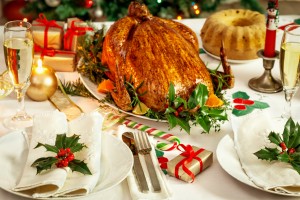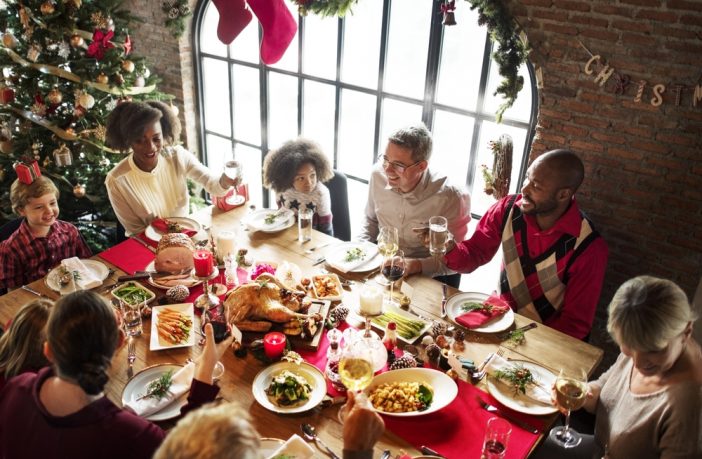The turkey is prepped, you’ve bought dozens of mince pies, there’s selection boxes ready and that’s all before the cheeseboard comes out. Good food is part of our festive celebrations, but do we go too far?
Professor Graham Harvey writes about why Christmas is a time of over-indulgence.
According to at least one carol, Christmas is a time of ‘good cheer’. Some people understand this to mean good news of salvation, redemption and a secure afterlife – whether or not this is the cause of the ‘good cheer’, those singing ‘We wish you a merry Christmas’ go on to ask for ‘some figgy pudding’. For them and many others, Christmas is a time of feasting. Gifts are given and people gather to eat more than usual. Generosity to less fortunate people is encouraged — just as the carol singers do when they sing ‘bring us some figgy pudding’. Originally, this was sung outside wealthier houses by people whose Christmas festivities would have been less merry if they did not gain consumable rewards for their singing. A similar tradition may be suggested when the Live Aid charity song asked us to ‘Let them know it’s Christmas’ by giving money for food, medicine and other necessities to those in need.

Christmas feasting can cause tensions
Christmas feasting can be contentious. Family gatherings can exacerbate tensions; gift giving can become competitive, but some think that Christmas feasting is a distraction from the ‘glad tidings’ of Jesus’ birth. They question the association of big meals with questions of salvation. This is not a new concern. It has vexed some Christian preachers since this midwinter festival was added to Christian calendars sometime in the third or fourth centuries of the Common Era. They have worried that feasting and giving gifts will trap people in materialism and the “desires of the flesh”. Other Christians think that this birthday is an excellent cause for celebration of communal sharing. So Christmas can cause tensions not only in our ordinary family lives but also in the life of Church communities.
Fixing the date for Christmas
Let’s go back a bit. Christmas was added to Christian calendars in the third to fourth century. Maybe that seems odd. Christmas was not accepted in many Christian communities for a long time (and is still rejected by some Churches). Part of the reason for this was birthdays were not particularly important; other events in people’s lives were considered more worthy causes of celebration. Also, Christianity typically has much more to do with Jesus’ death than his birth. This generated earlier and larger celebrations and rituals. In fact, when Christians did begin to celebrate Jesus’ birthday, they did not agree on when that should happen. There is nothing in early Christian texts to fix on a date. Eventually, however, 25th December was agreed on.
25th December was chosen as an appropriate day on which to honour the birth of Jesus because it was already a popular festive time. It was part of the celebration of the winter solstice. Too often this is presented negatively. It wasn’t that Christian leaders wanted to take over a popular festival and sanctify it for their own use. 25th December seemed an appropriate date for the same reason that it was selected as the birthday of other divine or semi-divine people (Mithras and the Invincible Sun especially). In the middle of winter, around the shortest day and longest night of the year, the sun rises and sets at it most southerly point on the horizon (in the northern hemisphere). On 25th December, the days begin to lengthen. There is going to be more light, more warmth, more liveliness. What better cause could there be for celebration?
Midwinter is something to celebrate
With celebrations at midwinter comes hope. We have got so far through the winter, we’ll get through the rest. Spring and summer will come. Let’s feast. Let’s give gifts. Let’s honour our good fortune by sharing what we have. That’s the mood of Christmas cheer and of other mid-winter festivities. It is at least part of why we eat too much at Christmas.
This post was originally published on OpenLearn.
Graham Harvey is Head of the Department of Religious Studies at the Open University.



